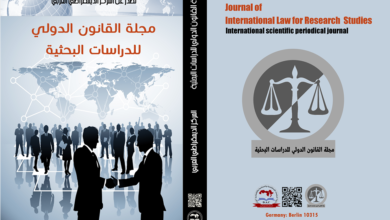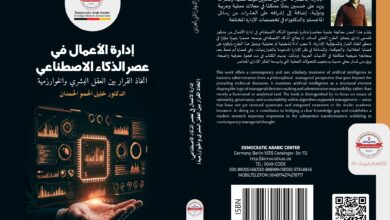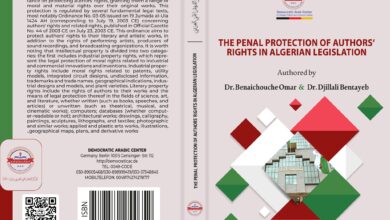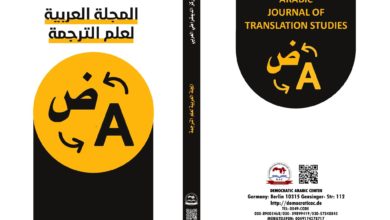الشراكة السياسية لدى حركات الإسلام السياسي
Political Partnership for Islamic Political Movement
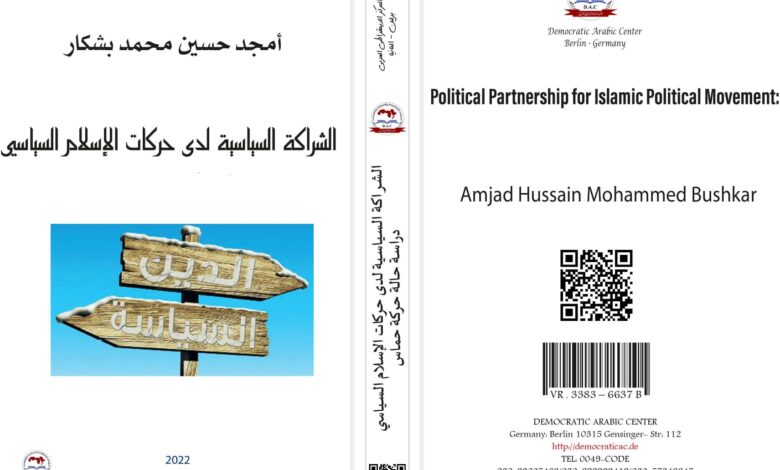
تأليف : أمجد حسين محمد بشكار
نسخة “pdf”-
الشراكة السياسية لدى حركات الإسلام السياسي
الطبعة الأولى “2022″ –من كتاب: – الشراكة السياسية لدى حركات الإسلام السياسي
جميع حقوق الطبع محفوظة #المركز_الديمقراطي_العربي ولا يسمح بإعادة إصدار هذا الكتاب أو اي جزء منه أو تخزينه في نطاق إستعادة المعلومات أو نقله بأي شكل من الأشكال، دون إذن مسبق خطي من الناشر .
تقديم:
هدفت الدراسة إلى التعرف على الصعوبات التي واجهتها حركات الإسلام السياسي في مجال الشراكة السياسية, وقدرتها على تقديم البرنامج السياسي على حساب البرنامج الاجتماعي كأولوية وطنية لإنتاج شراكة سياسية في العالم العربي.
لذا وضعت الدراسة سؤال المشكلة الرئيس والذي تمحور حول قدرة حركات الإسلام السياسي على أن تكون جزءاً من شراكة سياسية في الوطن العربي, وكذلك التعرف على أبرز المعيقات والتحديات التي واجهتها سواءً على الصعيد الفكري والسلوكي، والتي أعاقتها عن إنتاج شراكة سياسية, متخذة من حركة حماس نموذجاً كونها جزءاً متقدماً في حركات الإسلام السياسي وما هي الخصوصية الوطنية التي تتمتع بها حماس في إنتاج شراكة سياسية وطنية عامة تتمثل في برنامج وطني موحد؟.
تفترض الدراسة أن حركات الإسلام السياسي قد واجهت معيقات في ممارسة الحكم وتحقيق الشراكة السياسية, والتي تعود لسياسة الإقصاء والتهميش من قبل الأنظمة العربية, وقد تعاظمت هذه المشكلة بعد الربيع العربي وفوز الإسلاميين في الحكم حيث ظهرت معيقات وإشكاليات جديدة أمام الشراكة تتمثل في: مرجعية الدولة وقضايا الأمة والوطن، والدولة والانتخابات، وإعطاء أولوية للبرنامج الاجتماعي على السياسي.
اعتمدت الدراسة منهجية تقوم على مقاربتين: الأولى وهي منهجية دراسة الحالة، حيث تم تناول الشراكة السياسية كحالة واحدة وإخضاعها لفكر وسلوك حركات الإسلام السياسي والوقوف على ذلك من خلال مراجعة الأدبيات. أما المقاربة الثانية فقد قامت على استخدام المقابلات الشخصية مع المختصين وذوي الشأن في مختلف أقطار العالم العربي خاصة من أصّلوا لفكر الشراكة السياسية أو الفاعلين السياسيين الإسلاميين.
قسمت الدراسة إلى ثلاثة أجزاء رئيسة. الجزء الأول تناول الدولة في الفكرين الغربي والعربي لتبيان حجم البون والمفارقة بين النموذجين العربي والغربي في طبيعة وشكل إدارة الدولة، وهل الدولة العربية تصلح لأن تكون بيئة لإنتاج شراكة حقيقة, وما هي المتطلبات اللازم توفرها في الدولة لتحقيق ذلك. والجزء الثاني تناول حركات الإسلام السياسي للوقوف على سلوكها ومرتكزاتها الفكرية تجاه الشراكة السياسية. والجزء الثالث تناول حركة حماس والشراكة السياسية.
وقد خرجت الدراسة بمجموعة من الاستنتاجات ومن أبرزها:
إشكالية الشراكة التي تعاني منها كل القوى السياسية في العالم العربي وليست حكراً على أحد دون سواه، وهذا نتاج لتجربة تاريخية تداخلت بها عوامل ذاتية وأخرى موضوعية، ولذا فإن الحديث عن إيجاد الشراكة السياسية يتطلب الحديث عن العقد الاجتماعي والسياسي الجديد للدولة ولإدارتها. فالحركات الإسلامية جزء من نسيج المجتمع في الدولة العربية, وقد تم تغييبها كما غيّبت العديد من القوى السياسية. والاغتراب داخل الدولة لحركات الإسلام السياسي أدى إلى ذهاب حركات الإسلام السياسي إلى المجتمع وتشكيلها فكرة المجتمع العميق. فتاريخياً أصبح هنالك مجتمع عميق مركزيته الحركات الإسلامية ودولة عميقة مركزيتها العسكر والنظم الليبرالية. أحدثت حركة حماس بتبنيها وثيقة المبادئ والسياسات العامة والتي صدرت في عام 2017 حالة تمهد لبناء شراكة سياسية حقيقية في النظام والحياة السياسية على حد سواء. فقد قدمت حماس إجابات للعديد من الأسئلة التي وقفت عائقاً أمام الشراكة السياسية سابقاً ومن أبرزها، الدولة الفلسطينية، منظمة التحرير، المقاومة، إضافة إلى قضايا: البعد الوطني للحركة، وموضوع الديمقراطية، والمرأة، والآخر الفلسطيني.
By : Amjad Hussain Mohammed Bushkar
Abstract
This study aims to underpin the obstacles that Islamic Political Movements have faced in the realm of political partnership, and their ability to prioritize their political agenda at the expense of social goals in order to produce political partnership in the Arab world.
The question around which the research revolves is the possibility and willingness of Islamic Political Movements to engage within a framework of political partnership. However, this engagement is not friction-free endeavor. Therefore, we examine the main hindrances to this endeavorwhether they were intellectual or behavioral. Hamas movement represents the model that we take as a case. This selection is justified by the facts that Hamas is a leading force within Islamic Political Movements in the region, and that it is a peculiar case in terms of its relationship with other Palestinian factions and movements on the middleand opposite end of the political spectrum.
In order to grasp the core of the subject we claim that Islamic Movement have faced serious hindrances in functioning as a governing power, and obstacles to engage political partnership. Both hindrances stem from policies of exclusion and marginalization carried on by Arab regimes. This l was entrenched following Arab Spring upheavals and the victories Islamic Movements gained in general elections in a number of countries. As aresult,these movements became, engaged intellectually and behaviorally,in entertaining new obstacles to partnership including the nature of the state, the formation of the Umma, elections and institutional building.
Methodologically the study rests on case study analysis through which political partnership is examined in a broad sense and then in particular for Hamas. The main tool of research was interviews in addition to archival reviews and primary resources.
The study is lied over three major chapters: the first discussed the state in both Western and Arab thinking in order to show the deep differences between them in terms of the nature of the state, and the manner in which states are institutionalized. We show that the state in the Arab experience does not offer a conducive context for political partnership. Nor it provide necessary conditions for partnership. The second examines Islamic Political Movements to characterize their behavior and intellectual underpinnings pertaining to political partnership. In addition, the third discusses Hamas and political partnership.
Main conclusions of the research highlight the fact that political partnership is one of the most blatant problems that faces Arab political movements. This phenomenon is the result of historical experiences in which a number of subjective and objective factors intertwined in such a way to yield political disagreements. The discussion of political partnership lends itself to the question of social contract upon which states and societies in the Arab world are to rest. Islamic political movements represent an inseparable part of the social fabric in the Arab countries. However, they were marginalizedand alienated the state. Alienation compelled Islamic Political Movements to establish what we can call Deep Societiesin order to counterbalance the Deep Stateof military institutions and liberal forces.
By adapting and declaring the Document on Principles and Policies,Hamashas created a state of affairs that ley the ground for establishing a genuine political partnership. Hamashas put forth answers to many issues that prevented political partnership in the past among them the question of the Palestinian state, the position on the P.L.O, resistance, in addition to issues pertaining to: the national aspect of Hamas, democracy, women, and the Palestinian other.
- الناشر: المركز الديمقراطي العربي للدراسات الإستراتيجية والسياسية والاقتصادية


